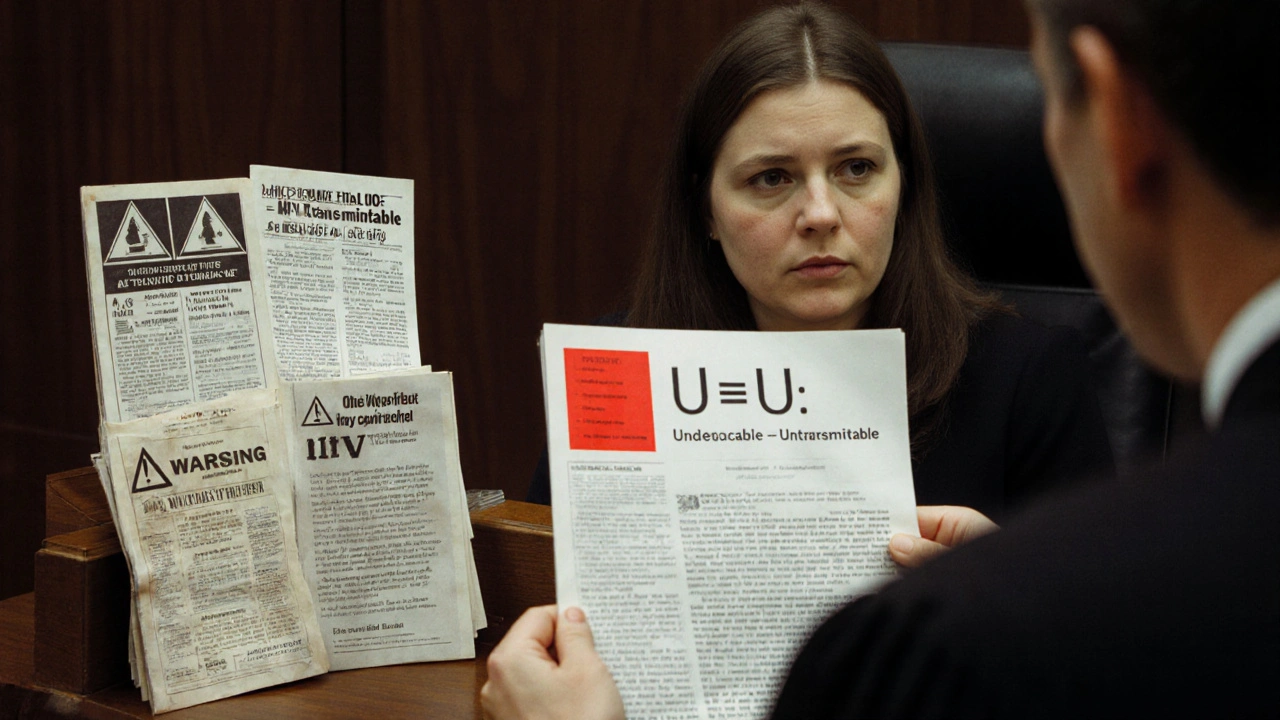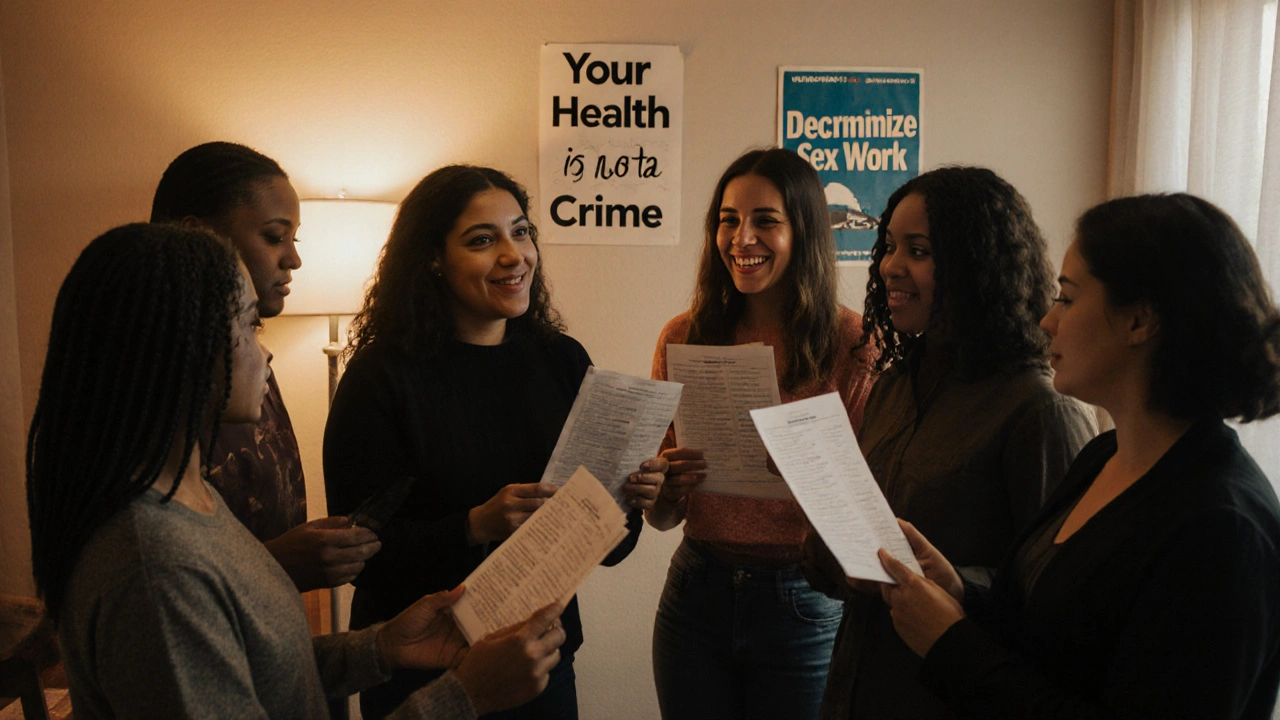If you’re a sex worker, knowing the law around HIV disclosure isn’t just about staying out of trouble-it’s about staying alive. In many places, failing to disclose your HIV status before sex can lead to criminal charges, even if no transmission happens. These laws don’t just target reckless behavior. They often trap people who are on treatment, have an undetectable viral load, and pose zero risk of passing HIV. And when you’re doing sex work, the stakes are higher. A single complaint, a misunderstanding, or a partner who changes their mind can turn your life upside down.
What Does Mandatory Disclosure Actually Mean?
Mandatory HIV disclosure laws require people living with HIV to tell sexual partners about their status before engaging in sex. In some countries, this applies to all sexual activity. In others, it’s only required for acts considered high-risk, like unprotected anal or vaginal sex. But here’s the catch: these laws rarely match the science.
Since 2008, research has shown that people with HIV who take antiretroviral therapy (ART) and maintain an undetectable viral load cannot transmit the virus. This is called U=U: Undetectable = Untransmittable. Yet, in places like Canada, the U.S., Australia, and parts of Europe, courts have still convicted people for not disclosing-even when their viral load was undetectable. In 2017, the Canadian Supreme Court ruled that disclosure isn’t required if there’s no realistic possibility of transmission. But enforcement varies wildly by province and judge.
In Australia, the situation is patchy. Each state has its own laws. In New South Wales, it’s a criminal offense to recklessly transmit HIV. In Victoria, the law focuses on intent. But in practice, police and prosecutors often treat non-disclosure as a crime regardless of risk. And if you’re a sex worker, you’re more likely to be targeted. Your work makes you visible. Your clients become witnesses. Your medical records can be subpoenaed.
How These Laws Hit Sex Workers Harder
Sex workers face unique risks under these laws. Unlike people in long-term relationships, sex workers often have brief, transactional encounters. There’s no time for deep conversations. Many clients refuse to use condoms, even when it’s against the worker’s boundaries. In some cases, clients threaten to report the worker to police if they don’t perform unprotected sex.
And when disclosure is legally required, what does that even look like? Do you need a signed form? A verbal statement recorded on video? A witness? The law doesn’t say. That means every encounter becomes a legal gamble. One client says you didn’t tell them. You say you did. No proof. You lose.
Studies from the Global Network of Sex Work Projects show that criminalization drives sex work further underground. Workers avoid testing because they fear their status will be used against them. They skip treatment because clinics are linked to police. They can’t negotiate safer sex because admitting they have HIV might mean losing income-or getting arrested.
In 2023, a sex worker in Perth was charged under Western Australia’s Public Health Act after a client alleged she didn’t disclose her HIV status. She had been on treatment for five years. Her viral load was undetectable. She used condoms in every session. The case was dropped after public outcry, but not before her name was published in local media. She lost three clients. One told her, “I don’t want to be near someone like you.”
The Gap Between Law and Science
The science is clear: HIV is not easily transmitted. It doesn’t spread through saliva, sweat, or casual contact. Even unprotected sex carries a low risk when the person with HIV is on treatment. A 2021 study in The Lancet followed nearly 1,000 serodifferent couples (one HIV-positive, one HIV-negative) who had unprotected sex over 10 years. There were zero transmissions from the partner with an undetectable viral load.
Yet, laws haven’t caught up. In 2024, the World Health Organization called on all countries to repeal HIV criminalization laws that don’t align with current medical evidence. The United Nations Human Rights Council called them “discriminatory and counterproductive.” But change is slow.
Some countries are moving forward. In 2022, Sweden revised its HIV laws to require proof of intent to harm-not just non-disclosure. In 2023, Germany removed HIV from its list of reportable diseases for criminal prosecution. But in the U.S., over 30 states still have HIV-specific criminal laws. Some date back to the 1980s, when HIV was misunderstood and feared.
Australia’s laws are outdated too. The federal government hasn’t updated its guidelines since 2015. State health departments still hand out pamphlets warning that “not telling someone you have HIV is a crime,” without mentioning U=U. Doctors are rarely trained to explain the legal risks to their patients. And sex workers? They’re left to figure it out alone.

What Can Sex Workers Do to Protect Themselves?
There’s no perfect legal shield, but there are steps you can take to reduce risk:
- Know your local laws. In Western Australia, disclosure is required before sex if you have a communicable disease. In Queensland, it’s only required if you intend to transmit. Don’t assume the law is the same everywhere-even within your country.
- Get tested regularly. If you know your status, you can manage it. If you don’t, you’re playing Russian roulette with the law and your health.
- Stay on treatment. If you’re HIV-positive, being on ART and undetectable is your strongest legal and medical defense. Keep proof of your viral load test results.
- Use condoms. Even if the law doesn’t require it, condoms remove any doubt. They’re your best physical and legal protection.
- Document consent. Some workers use apps to record verbal consent before a session. Others ask clients to sign a simple form stating they were informed of HIV status and chose to proceed. It’s not foolproof, but it creates a paper trail.
- Connect with support groups. Organizations like Scarlet Alliance (Australia) and the Global Network of Sex Work Projects offer legal advice, peer networks, and advocacy. You’re not alone.
Why These Laws Don’t Work
These laws were sold as public health tools. But they don’t reduce HIV transmission. They increase stigma. They discourage testing. They punish people who are already vulnerable.
A 2020 study in The Journal of the International AIDS Society found that countries with HIV criminalization laws had higher rates of new infections-not lower. Why? Because fear keeps people from getting tested. If you don’t know your status, you can’t disclose. If you’re afraid of jail, you won’t go to the clinic. And if you’re not in care, your viral load rises. That’s when transmission risk goes up.
These laws also target marginalized groups. Most prosecutions involve women, Indigenous people, migrants, and sex workers. The same people who already face poverty, violence, and discrimination. The law doesn’t protect them. It weaponizes their vulnerability.
And let’s be honest: if someone wants to harm another person with HIV, they’ll find a way. Criminalizing non-disclosure doesn’t stop predators. It just makes it easier to scapegoat people living with HIV.

The Bigger Picture: Rights Over Fear
Sex work is work. People living with HIV are not criminals. And no one should be locked up because they didn’t tell a client their status-especially when science says it doesn’t matter.
Real public health means access to testing, treatment, and education. It means decriminalizing sex work so workers can report violence without fear. It means trusting people to make informed choices, not punishing them for being honest.
If you’re a sex worker, you have rights. You have the right to safety. To health. To dignity. You don’t need to beg for permission to protect yourself. You just need to know the law-and who to call when it fails you.
Is it illegal to have sex if I have HIV and don’t tell my partner?
In many places, yes-but only if the law requires disclosure and you didn’t follow it. Even then, the law doesn’t always match science. In Australia, for example, it depends on the state. In some areas, you can be charged even if you used a condom and had an undetectable viral load. In others, intent matters more than disclosure. Always check your local laws.
Can I be prosecuted if my viral load is undetectable?
Yes, unfortunately. Even though U=U (Undetectable = Untransmittable) is scientifically proven, courts in many countries still convict people for non-disclosure regardless of viral load. In Australia, a 2023 case in Victoria saw a sex worker charged despite having an undetectable viral load for over four years. The court ruled that disclosure was legally required, regardless of risk. Science doesn’t always win in court.
What should I do if a client threatens to report me for not disclosing?
Stay calm. Don’t escalate. Document everything: time, location, what was said. If possible, record the conversation (check your state’s laws on audio recording first). Contact a sex worker organization like Scarlet Alliance or the Human Rights Law Centre. They can help you understand your rights and may connect you with a lawyer. Never feel pressured to have unprotected sex. Your safety comes first.
Do I have to tell every client I meet?
Legally, it depends on where you are. In some jurisdictions, you must disclose before any sexual contact. In others, only if there’s a significant risk of transmission. But since the law is unclear and inconsistently applied, many sex workers choose to disclose to avoid legal risk-even if it’s not strictly required. It’s a personal decision, but one that carries real consequences.
Can my medical records be used against me in court?
Yes. If you’re investigated or charged, police can subpoena your HIV test results, treatment history, and viral load reports. This is why some workers avoid clinics or delay testing. But hiding your status doesn’t protect you-it makes things worse. The safest path is to know your status, stay on treatment, and build a support network that can help you navigate the legal system.
Where to Get Help
If you’re a sex worker living with HIV, you don’t have to face this alone. These organizations offer free, confidential support:
- Scarlet Alliance - Australia’s national peak body for sex workers. Offers legal referrals, peer support, and advocacy.
- The Human Rights Law Centre - Provides legal advice on discrimination and criminalization cases.
- Positive Life NSW - Offers counseling and support for people living with HIV in New South Wales.
- Global Network of Sex Work Projects (NSWP) - Connects sex workers worldwide with legal and health resources.
These groups know the laws. They’ve seen the cases. They’ve fought the battles. They can help you understand your rights-and how to protect them.
